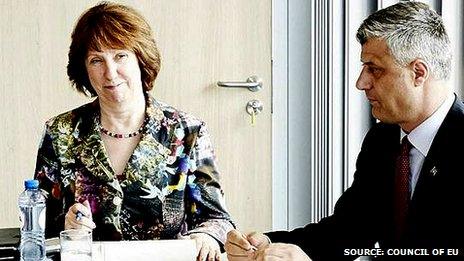EU chided over diplomatic service run by Baroness Ashton
- Published

Catherine Ashton brokered a deal between Serbia and Kosovo's PM Hashim Thaci (right) after months of tough talks
The EU's diplomatic service says it is saving 18.5m euros (£16m; $24m) in a staff reorganisation, amid criticism from the European Parliament.
On Tuesday the parliament's foreign affairs committee called the service top-heavy and slow to react to crises.
The European External Action Service (EEAS), created in December 2010, is led by Catherine Ashton from the UK.
She plans to cut 17 posts and downgrade 14 senior-level jobs, her spokesman Michael Mann told the BBC.
"To say the EEAS is top-heavy is an exaggeration," Mr Mann said on Wednesday, referring to the report presented by MEPs Elmar Brok and Roberto Gualtieri.
"However, a lot of what's in the report is what the high representative [Baroness Ashton] herself already presented to [EU] ministers in Dublin last month, in terms of making changes to the structure. We've got pretty much universal support from ministers on this," he explained.
Baroness Ashton, a Labour Party peer, plans to stand down at the end of next year and has made it clear she will not seek a second term. Her appointment in 2009 was controversial and she has faced flak over her handling of foreign policy.
Plea for briefings
The MEPs' draft report, external said "the current structure of the EEAS is too top-heavy and marked by too many decision-making layers".
The MEPs also want the EEAS to be more accountable, by systematically briefing MEPs who specialise in particular foreign policy issues.
The service's decision-making in the Mali crisis was too slow, the MEPs say. The French military, assisted by West African troops, eventually pushed back Islamist rebels who had seized the northern half of the country.
Referring to the Arab revolutions - in Tunisia, Egypt and Syria - the MEPs say the EU failed to reallocate resources, including staff, to match changed priorities.
The full parliament is expected to vote on the recommendations in June, and they will feed into a wider EU review of the EEAS's operations.
Mr Mann defended the EEAS's response to Mali and the Arab upheaval.
"We had a policy for the Sahel in place in 2011, long before the Mali crisis hit the headlines. We're unduly criticised for being slow to react," he said.
"If you look at the Arab Spring, the changes in Burma, we've always been very quick to adjust policy accordingly."
Somalia nation-building
He also pointed to the landmark Serbia-Kosovo agreement reached on Friday, which was brokered by Baroness Ashton in 10 rounds of gruelling talks.
In Somalia the EEAS has been co-ordinating the EU's efforts to rebuild damaged state institutions, curb piracy and thwart Islamist militants, who have been fighting African Union troops. The number of pirate attacks has dropped sharply in the past year.
"The Somali president praised the EU's work in his country," Mr Mann said.
"We do classic diplomacy, political support, development aid, military training - the whole gamut. We believe it is very joined up and a better crisis response than we had before."
MEPs expressed concern that national governments might have too much leverage over top EEAS appointments.
Under the deal that set up the EEAS, it was to draw a third of its staff from national diplomatic services - a target that has been reached.
Mr Mann said the EEAS was getting "very strong candidates from the member states - but two-thirds of the staff are still from EU institutions".
- Published24 April 2013
- Published7 December 2010
- Published7 December 2012